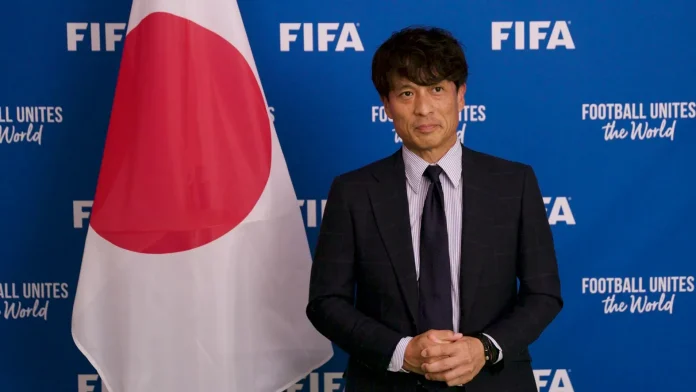Japan has set its sights on hosting the 2031 Women’s World Cup, a bold move aimed at transforming the country’s women’s football landscape and closing the gap with Europe and North America.
As a nation with a rich footballing history, Japan is no stranger to the global stage, having won the 2011 Women’s World Cup, but the country has since struggled to maintain that momentum.
By bringing the prestigious tournament to its shores, Japan hopes to ignite a new era of growth and enthusiasm for women’s football.
The Japan Football Association (JFA) president, Tsuneyasu Miyamoto, has expressed the nation’s determination to host the 2031 Women’s World Cup in a bid to boost the sport’s domestic profile.
In an interview, Miyamoto highlighted the country’s desire to “raise the value of women’s football” and create a more sustainable and passionate football culture.
While Japan enjoyed a surge of interest after their 2011 World Cup victory, that enthusiasm quickly fizzled out, and the country’s women’s football scene has struggled to keep pace with the booming leagues in Europe and the United States.
Miyamoto is keen to ensure that Japan capitalizes on the opportunity to host a global tournament, similar to how co-hosting the 2002 Men’s World Cup sparked a surge in football interest among the Japanese public.
As a former player and now the head of the JFA, Miyamoto knows firsthand the impact a major event can have on the growth of the sport.
The Challenges Ahead: Competition for Hosting Rights
Their ambition to host the 2031 Women’s World Cup faces stiff competition. A joint bid from the United States and Mexico is expected, with both nations boasting strong footballing cultures and established infrastructures.
England and China have also expressed interest in hosting the tournament, making it a highly competitive race for the hosting rights.
Despite the challenges, Miyamoto believes Japan has a unique offering. The country’s passion for football, combined with its rich history of successfully hosting international sporting events, makes it a strong candidate.
Hosting the Women’s World Cup would be a significant step toward reviving interest in the sport and building a lasting legacy for future generations.
RECOMMENDED:
One of the key factors driving Japan’s bid to host the 2031 Women’s World Cup is the desire to strengthen the country’s WE League, a professional women’s football league that launched in 2021.
Despite the league’s promise, it has struggled to attract the same level of attention, attendance, and revenue seen in women’s leagues in Europe and the United States.
Miyamoto acknowledges the challenges, stating that “the WE League has been struggling to gather an audience.” Hosting the Women’s World Cup could serve as a catalyst for the league, drawing attention to the domestic game and inspiring a new generation of female footballers.
By increasing visibility and fostering greater community support, the hope is that the WE League will grow into a competitive and sustainable league that mirrors the success of other global leagues.
Learning from Europe: Building a Football Culture in Japan
Their bid to host the 2031 Women’s World Cup is not just about putting on a show—it’s about building a lasting football culture. Miyamoto, who spent time playing in Europe, including a stint at Red Bull Salzburg, has been inspired by the way European countries have integrated football into their daily lives.
“We haven’t built that kind of community here in Japan. I’d like to make football our culture,” Miyamoto explained. To achieve this, Japan needs to create a football environment where the sport is embraced at every level, from grassroots to professional leagues. The Women’s World Cup could provide the perfect platform to kickstart this cultural shift.
Japan’s Footballing Legacy: From 2011 Glory to Today’s Aspirations
Japan’s women’s football team has a proud legacy, having won the 2011 Women’s World Cup and finishing as runners-up in 2015. However, the team has struggled to replicate that success in recent years, failing to advance beyond the quarterfinals since their loss to the United States in the 2015 final.
Miyamoto believes that Japan “could have done better” to maintain the momentum from their 2011 victory, and the 2031 Women’s World Cup offers a chance to reignite the passion that once surrounded the sport.
With many of Japan’s top players now competing in Europe’s elite leagues, the national team continues to benefit from international experience, but the domestic game still needs significant development.
Overcoming Financial Challenges: Transfer Fees and Club Support
One of the challenges facing Japanese football, particularly at the club level, is the relatively low transfer fees for Japanese players compared to their South American counterparts. Kaoru Mitoma, one of Japan’s brightest talents, joined Brighton for just £2.5 million in 2021, while Kyogo Furuhashi was signed by Celtic for £4.5 million in the same year. Miyamoto points out that Japanese clubs need to strengthen their negotiating positions to ensure they can continue producing top talent and benefit financially from player transfers.
“In Europe, clubs are very strong, but in Japan, clubs are not that strong,” said Miyamoto. He is determined to bring a new way of thinking to Japanese football, drawing on his experiences as a player, coach, and sports executive. By doing so, he hopes to foster a more competitive and financially sustainable football ecosystem in Japan.





